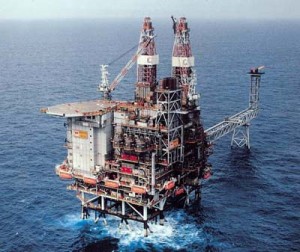 West Texas Intermediate fell on Tuesday amid concerns a slowing Chinese economy will reduce oil demand in the country, the second biggest consumer after the US. The oil market was further pressured by the prospects of increasing Iranian crude exports after the Islamic republic fulfilled its initial nuclear commitments, a sign of its determination. Ongoing supply outages in Libya and South Sudan however underpinned the market.
West Texas Intermediate fell on Tuesday amid concerns a slowing Chinese economy will reduce oil demand in the country, the second biggest consumer after the US. The oil market was further pressured by the prospects of increasing Iranian crude exports after the Islamic republic fulfilled its initial nuclear commitments, a sign of its determination. Ongoing supply outages in Libya and South Sudan however underpinned the market.
On the New York Mercantile Exchange, WTI crude for delivery in March fell by 0.16% to $94.44 per barrel by 8:40 GMT. Prices shifted in a daily range between $93.65 and $94.48 a barrel. Floor trading in the US was closed yesterday due to the Martin Luther King Jr. holiday, therefore transactions will be booked today for settlement purposes. Prices are almost unchanged on weekly basis, up 0.1%.
Meanwhile on the ICE, Brent futures for settlement in the same month rose by 0.55% to $106.94 per barrel by 8:39 GMT. The European benchmark varied between days high and low of $107.09 and $106.28 a barrel respectively. Prices retreated 0.1% on Monday.
Oil prices continued to be pressured by concerns of reduced demand prospects as latest data pointed to a slowing Chinese economy. China’s National Bureau of Statistics reported on Monday that output in factories, mines and utilities grew at a slower pace in December, fueling concerns over economic slowdown and demand for riskier assets. China’s industrial production grew by 9.7% on an annual basis last month, the slowest since July, trailing analysts’ expectations for a drop to 9.8% from November’s 10% advance.
Meanwhile, China’s economy grew by 1.8% in the fourth quarter, the government agency reported, underperforming projections that expansion would ease to 2.0% after posting at 2.2% in the three months through September.
China’s economy expanded by 7.7% in 2013, matching the median estimate of analysts surveyed by Bloomberg. This was also the same expansion rate as in 2012, which however was the slowest since 1999.
A private report later in the week is projected to show that the Asian nations manufacturing growth slowed in January. The preliminary HSBC Manufacturing PMI is expected to post at 50.3 this month, down from Decembers final reading of 50.5. If confirmed, this would be the slowest manufacturing expansion since September.
Chinese demand
Also fanning negative sentiment, data showed on Monday that Chinas oil demand rose in 2013 at the slowest pace in more than two decades. The Asian countrys implied oil demand jumped by 150 000 barrels per day, or 1.6%, trailing the International Energy Agencys forecast to grow by 3.8%. The IEA said in its monthly report in December it expects Chinese oil demand to average 10.19 million bpd in 2013, 370 000 bpd more than a year earlier. The agencys expectations for this years growth are for a similar 3.7% increase in consumption, hitting 10.57 million bpd.
The actual increase however was in line with forecasts by China National Petroleum Corporation (CNPC), the nations top oil company. In December, Chinas implied oil demand stood at 10.06 million bpd, up 1.2% from Novembers 9.94 million bpd, but retreating by 7.5% from a record high 10.88 million bpd a year earlier.
Iran deal
Prices were also pressured after Iran complied with international requirements and fulfilled its initial commitments according to the nuclear deal that was struck last November. The United States and the European Union followed through on their side of the accord and both suspended some trade and other restrictions against the Persian Gulf nation.
The US will allow Irans six current oil buyers to maintain their purchases at the same pace during the next six months, while the interim nuclear deal between the Islamic republic and six world powers is in force and the two sides work their way toward a permanent solution. A US official said Iran is currently exporting only 40% of what it was shipping two years ago before tough sanctions against the OPEC member were applied.
However, broad market expectations point at no imminent return of additional Iranian oil to the global markets, which allowed short-term geopolitical factors to have a stronger influence on prices. Fears of further supply outages in South Sudan and Libya supported the oil complex.
The Libyan government said it plans to remove by force protesters blocking the country’s eastern oil export terminals. The three ports in question have been closed off by armed rebel groups since the summer and an eventual reopening could bring back online a combined capacity of 600 000 bpd, which would restore nationwide output close to its previous levels.
Meanwhile, South Sudans president said the army regained control over the regional capital Malakal back from rebels, which however was dismissed by the insurgents. Growing unrest in Iraq also boosted market sentiment.





